Carmen Buchrieser
@cbuch.bsky.social
Reposted by Carmen Buchrieser
🇬🇧🇫🇷 "By working together we can overcome challenges faster"
Pasteur Foundation UK launched the formal @institutpasteur x @ox.ac.uk partnership in London.
From climate to AMR, cross-border collaboration is science's engine.
↘️ www.pasteurfoundation.uk/pasteur-oxfo...
Pasteur Foundation UK launched the formal @institutpasteur x @ox.ac.uk partnership in London.
From climate to AMR, cross-border collaboration is science's engine.
↘️ www.pasteurfoundation.uk/pasteur-oxfo...

November 4, 2025 at 8:30 AM
🇬🇧🇫🇷 "By working together we can overcome challenges faster"
Pasteur Foundation UK launched the formal @institutpasteur x @ox.ac.uk partnership in London.
From climate to AMR, cross-border collaboration is science's engine.
↘️ www.pasteurfoundation.uk/pasteur-oxfo...
Pasteur Foundation UK launched the formal @institutpasteur x @ox.ac.uk partnership in London.
From climate to AMR, cross-border collaboration is science's engine.
↘️ www.pasteurfoundation.uk/pasteur-oxfo...
Reposted by Carmen Buchrieser
De-DUFing the DUFs 🧩 @franznarberhaus.bsky.social lab uncovers how small DUF1127 proteins regulate #phosphate uptake by binding the sensor kinase PhoR. Their conserved role from Agrobacterium to E. coli highlights how even small DUFs can shape bacterial physiology 🦠
buff.ly/jJd9Eho
buff.ly/jJd9Eho

October 21, 2025 at 7:02 AM
De-DUFing the DUFs 🧩 @franznarberhaus.bsky.social lab uncovers how small DUF1127 proteins regulate #phosphate uptake by binding the sensor kinase PhoR. Their conserved role from Agrobacterium to E. coli highlights how even small DUFs can shape bacterial physiology 🦠
buff.ly/jJd9Eho
buff.ly/jJd9Eho
Reposted by Carmen Buchrieser
Thus, single-cell metabolic dynamics can forecast infection outcomes. In the spirit of @stephenwolfram.bsky.social's ideas, bacterial infection exhibits pockets of computational reducibility at the single-cell scale. Might this point to new ways to predict infection progression?

October 16, 2025 at 12:55 PM
Thus, single-cell metabolic dynamics can forecast infection outcomes. In the spirit of @stephenwolfram.bsky.social's ideas, bacterial infection exhibits pockets of computational reducibility at the single-cell scale. Might this point to new ways to predict infection progression?
Reposted by Carmen Buchrieser
So we trained an explainable Machine Learning model using Δψm + mROS dynamics, and the AI model predicted which infected cell will support replication with 83% accuracy before bacterial replication begins

October 16, 2025 at 12:55 PM
So we trained an explainable Machine Learning model using Δψm + mROS dynamics, and the AI model predicted which infected cell will support replication with 83% accuracy before bacterial replication begins
Reposted by Carmen Buchrieser
What make these permissive macrophages different? Before bacteria replicate, macrophages that will permit bacterial growth already show sustained mitochondrial membrane potential (Δψm) and higher mitochondrial ROS (mROS). These are early mitochondrial signals of permissive cells!

October 16, 2025 at 12:55 PM
What make these permissive macrophages different? Before bacteria replicate, macrophages that will permit bacterial growth already show sustained mitochondrial membrane potential (Δψm) and higher mitochondrial ROS (mROS). These are early mitochondrial signals of permissive cells!
Reposted by Carmen Buchrieser
We tracked thousands of living primary human macrophages during infection with Legionella pneumophila, using high-throughput live imaging + our BATLI backtracking software. Legionella only replicates in ~20% infected primary macrophages!
www.nature.com/articles/s41...
www.nature.com/articles/s41...

Backtracking metabolic dynamics in single cells predicts bacterial replication in human macrophages - Nature Communications
Computational models can help to explain the dynamics of cellular infection with pathogens. Here the authors use computational models to assess the single cell infection parameters of human macrophage...
www.nature.com
October 16, 2025 at 12:55 PM
We tracked thousands of living primary human macrophages during infection with Legionella pneumophila, using high-throughput live imaging + our BATLI backtracking software. Legionella only replicates in ~20% infected primary macrophages!
www.nature.com/articles/s41...
www.nature.com/articles/s41...
Reposted by Carmen Buchrieser
New paper finally out on @natcomms.nature.com! Led by first author Maria Dramé with the collaboration of Francisco Garcia, @cbuch.bsky.social and @jytinevez.bsky.social at @pasteur.fr. Early mitochondrial signals in single human macrophages predict later Legionella replication. Link + details👇🧵

October 16, 2025 at 12:55 PM
New paper finally out on @natcomms.nature.com! Led by first author Maria Dramé with the collaboration of Francisco Garcia, @cbuch.bsky.social and @jytinevez.bsky.social at @pasteur.fr. Early mitochondrial signals in single human macrophages predict later Legionella replication. Link + details👇🧵
Reposted by Carmen Buchrieser
Some #Pseudomonas aeruginosa strains naturally lack the major virulence system T3SS. 🦠 @inaattree.bsky.social & @cbuch.bsky.social labs reveal that avirulent isolates still produce valuable metabolites (e.g. rhamnolipids, elastase, pyoverdine)—making them promising for #biotech use.
buff.ly/JST7ZR1
buff.ly/JST7ZR1

October 4, 2025 at 10:01 AM
Some #Pseudomonas aeruginosa strains naturally lack the major virulence system T3SS. 🦠 @inaattree.bsky.social & @cbuch.bsky.social labs reveal that avirulent isolates still produce valuable metabolites (e.g. rhamnolipids, elastase, pyoverdine)—making them promising for #biotech use.
buff.ly/JST7ZR1
buff.ly/JST7ZR1
Reposted by Carmen Buchrieser
Save the date! The @pasteur.fr Pasteur course on image analysis is announced:
It will happen from the 1st of June to the 5th 2026.
This year there will be only one track: the Early Career Investigator track (beginners). 👇
It will happen from the 1st of June to the 5th 2026.
This year there will be only one track: the Early Career Investigator track (beginners). 👇

September 10, 2025 at 12:50 PM
Save the date! The @pasteur.fr Pasteur course on image analysis is announced:
It will happen from the 1st of June to the 5th 2026.
This year there will be only one track: the Early Career Investigator track (beginners). 👇
It will happen from the 1st of June to the 5th 2026.
This year there will be only one track: the Early Career Investigator track (beginners). 👇
Reposted by Carmen Buchrieser
I am so proud to be part of this work, that we initiated Fernando de la Cruz and I, when he was on sabbatical in my lab in 2009... it took so much time for this achievement, 1000 thanks to Raúl Fernández-López! this brought me back to my PhD on cyanobacteria genetics. www.pnas.org/doi/10.1073/...

Mutations in the circadian cycle drive adaptive plasticity in cyanobacteria | PNAS
Circadian clocks allow organisms to anticipate daily fluctuations in light and temperature,
but how this anticipatory role promotes adaptation to d...
www.pnas.org
September 19, 2025 at 5:32 AM
I am so proud to be part of this work, that we initiated Fernando de la Cruz and I, when he was on sabbatical in my lab in 2009... it took so much time for this achievement, 1000 thanks to Raúl Fernández-López! this brought me back to my PhD on cyanobacteria genetics. www.pnas.org/doi/10.1073/...
Reposted by Carmen Buchrieser
New publication | Science Advances www.science.org/doi/10.1126/...

Plasticity of ventricle position after heart looping in heterotaxy with right isomerism
The left/right position of ventricles needs to be maintained after heart looping, an unexpected step affected in heterotaxy.
www.science.org
September 24, 2025 at 5:27 PM
New publication | Science Advances www.science.org/doi/10.1126/...
Reposted by Carmen Buchrieser
🔎 Find us at the 77th #DGHM Meeting in #Jena! Gabriele Pradel, Anja Lührmann, Sandra Reuter, Bärbel Stecher and others are happy to tell you more about our German network for women in infection research! 💜
👩🔬@gabrielepradel.bsky.social @sandrareuter.bsky.social @baerboletta.bsky.social
👩🔬@gabrielepradel.bsky.social @sandrareuter.bsky.social @baerboletta.bsky.social

September 23, 2025 at 8:19 AM
🔎 Find us at the 77th #DGHM Meeting in #Jena! Gabriele Pradel, Anja Lührmann, Sandra Reuter, Bärbel Stecher and others are happy to tell you more about our German network for women in infection research! 💜
👩🔬@gabrielepradel.bsky.social @sandrareuter.bsky.social @baerboletta.bsky.social
👩🔬@gabrielepradel.bsky.social @sandrareuter.bsky.social @baerboletta.bsky.social
Reposted by Carmen Buchrieser
Phages are promising against antibiotic-resistant bacteria—but resistance can emerge. 🦠 New work from @baerboletta.bsky.social lab shows E. coli can resist phages in the lab, but in the gut that resistance comes at a cost: context is crucial for #PhageTherapy success.
buff.ly/NLOjnE2
buff.ly/NLOjnE2

September 27, 2025 at 8:00 AM
Phages are promising against antibiotic-resistant bacteria—but resistance can emerge. 🦠 New work from @baerboletta.bsky.social lab shows E. coli can resist phages in the lab, but in the gut that resistance comes at a cost: context is crucial for #PhageTherapy success.
buff.ly/NLOjnE2
buff.ly/NLOjnE2
Reposted by Carmen Buchrieser
Delighted to see our paper studying the evolution of plasmids over the last 100 years, now out! Years of work by Adrian Cazares, also Nick Thomson @sangerinstitute.bsky.social - this version much improved over the preprint. Final version should be open access, apols.
Thread 1/n
Thread 1/n

September 25, 2025 at 9:29 PM
Delighted to see our paper studying the evolution of plasmids over the last 100 years, now out! Years of work by Adrian Cazares, also Nick Thomson @sangerinstitute.bsky.social - this version much improved over the preprint. Final version should be open access, apols.
Thread 1/n
Thread 1/n
Reposted by Carmen Buchrieser
🦠 Mycobacteria aren't just tough, they're interior designers! 🦠 Check out our latest #preprint 🚨, led by our PhD student @camimille.bsky.social , where we show that #Mycobacterium tuberculosis builds secret cytoplasmic membranes to adapt its metabolism and sneak past immunity 🤫
Thread coming soon!
Thread coming soon!
Nitrate-responsive Mycobacterial Intracytoplasmic Membranes dampen Inflammation during Mycobacterium tuberculosis Infection https://www.biorxiv.org/content/10.1101/2025.09.17.676823v1
September 18, 2025 at 4:58 PM
🦠 Mycobacteria aren't just tough, they're interior designers! 🦠 Check out our latest #preprint 🚨, led by our PhD student @camimille.bsky.social , where we show that #Mycobacterium tuberculosis builds secret cytoplasmic membranes to adapt its metabolism and sneak past immunity 🤫
Thread coming soon!
Thread coming soon!
Reposted by Carmen Buchrieser
🇪🇺 Smooth publishing experience with #microLife, the new @femsjournals.bsky.social journal of the European Academy for Microbiology.
🙏 @erc.europa.eu, F.R.S-FNRS & WEL-RI for support
4/4
🙏 @erc.europa.eu, F.R.S-FNRS & WEL-RI for support
4/4
September 17, 2025 at 7:27 AM
🇪🇺 Smooth publishing experience with #microLife, the new @femsjournals.bsky.social journal of the European Academy for Microbiology.
🙏 @erc.europa.eu, F.R.S-FNRS & WEL-RI for support
4/4
🙏 @erc.europa.eu, F.R.S-FNRS & WEL-RI for support
4/4
Reposted by Carmen Buchrieser
🚨New paper out! #MicroSky
Studying obligate predators like Bdellovibrio bacteriovorus is tricky—essential genes for predation are also essential for survival.
We expanded its genetic toolbox:
🧬promoters to fine-tune expression
🧬IPTG-inducible system
🧬CRISPRi for rapid knockdown
bit.ly/46GUn2c
1/4
Studying obligate predators like Bdellovibrio bacteriovorus is tricky—essential genes for predation are also essential for survival.
We expanded its genetic toolbox:
🧬promoters to fine-tune expression
🧬IPTG-inducible system
🧬CRISPRi for rapid knockdown
bit.ly/46GUn2c
1/4

Expanding the genetic toolbox of the obligate predatory bacterium Bdellovibrio bacteriovorus with inducible gene expression and CRISPR interference
Inducible gene expression and CRISPR interference-mediated depletion in the predatory bacterium Bdellovibrio bacteriovorus.
academic.oup.com
September 17, 2025 at 7:27 AM
🚨New paper out! #MicroSky
Studying obligate predators like Bdellovibrio bacteriovorus is tricky—essential genes for predation are also essential for survival.
We expanded its genetic toolbox:
🧬promoters to fine-tune expression
🧬IPTG-inducible system
🧬CRISPRi for rapid knockdown
bit.ly/46GUn2c
1/4
Studying obligate predators like Bdellovibrio bacteriovorus is tricky—essential genes for predation are also essential for survival.
We expanded its genetic toolbox:
🧬promoters to fine-tune expression
🧬IPTG-inducible system
🧬CRISPRi for rapid knockdown
bit.ly/46GUn2c
1/4
Reposted by Carmen Buchrieser
So excited our antibiotic potentiation story is out 🤩 Led by the extraordinary @manonlang.bsky.social with @fox-science.bsky.social & @amazeld.bsky.social +amazing collaborators @immunobladder.bsky.social @imaneelmeouche.bsky.social 🦠 We believe it can make a difference in #AMR infections!

Uridine as a potentiator of aminoglycosides through activation of carbohydrate transporters
Uridine boosts aminoglycoside treatment efficiency against antibiotic-susceptible as well as antibiotic-resistant E. coli strains.
www.science.org
September 6, 2025 at 9:35 AM
So excited our antibiotic potentiation story is out 🤩 Led by the extraordinary @manonlang.bsky.social with @fox-science.bsky.social & @amazeld.bsky.social +amazing collaborators @immunobladder.bsky.social @imaneelmeouche.bsky.social 🦠 We believe it can make a difference in #AMR infections!
Reposted by Carmen Buchrieser
New preprint in the lab! How the mitochondrial ETC works during infection of human macrophages with #Legionella or #Salmonella? Spoiler: there are some similarities and also pathogen-specific differences. Work led by Francisco Garcia and Paula Martínez, with @cbuch.bsky.social at @pasteur.fr

September 5, 2025 at 2:08 PM
New preprint in the lab! How the mitochondrial ETC works during infection of human macrophages with #Legionella or #Salmonella? Spoiler: there are some similarities and also pathogen-specific differences. Work led by Francisco Garcia and Paula Martínez, with @cbuch.bsky.social at @pasteur.fr
Reposted by Carmen Buchrieser
🔬 We’re past the midpoint of the year; perfect time to look back at what’s been discovered so far. From how Salmonella slows its escape from immune cells to the microbes thriving in oil reservoirs, these are the most-read #microLife papers of 2025 so far: buff.ly/TfhOvEc
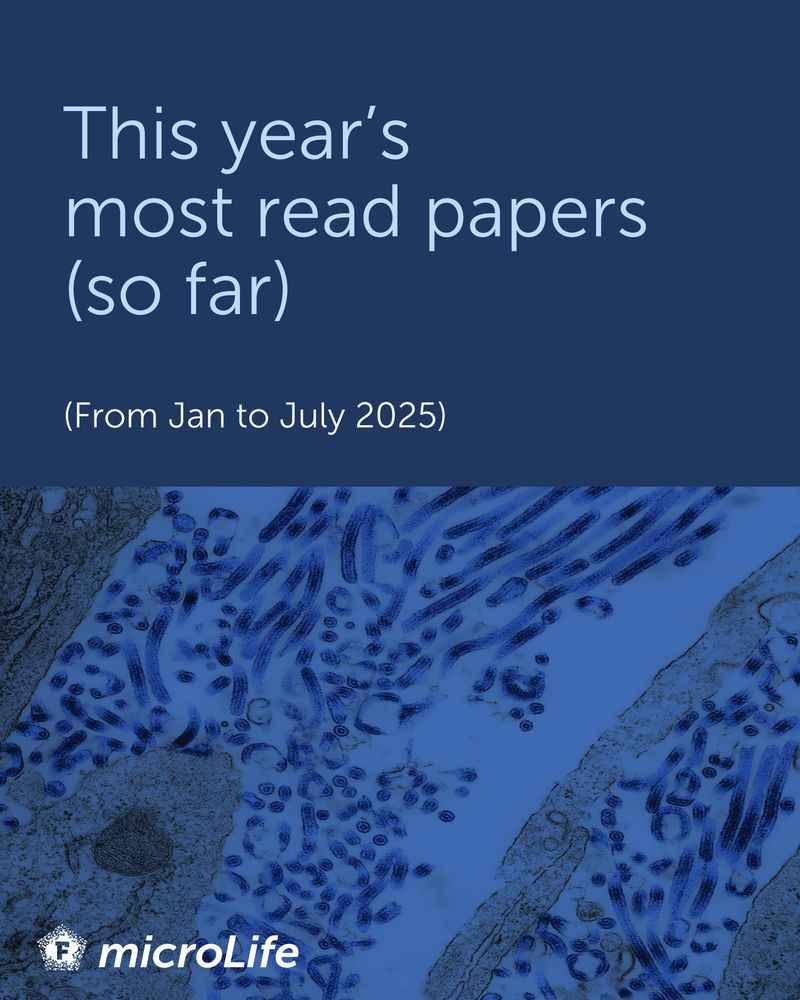
August 13, 2025 at 12:01 PM
🔬 We’re past the midpoint of the year; perfect time to look back at what’s been discovered so far. From how Salmonella slows its escape from immune cells to the microbes thriving in oil reservoirs, these are the most-read #microLife papers of 2025 so far: buff.ly/TfhOvEc
Reposted by Carmen Buchrieser
I was very honored to receive on of the Poster prizes at FEMS MICRO 2025 in Milan a few weeks back. It was such a great conference, heard so many interesting and stimulating talks & poster discussions.
🏆 Congratulations to the FEMS MICRO 2025 Poster Prize winners! 🎉
Editors from each of the FEMS Journals selected 7 outstanding posters based on their scientific excellence and impactful communication to celebrate microbiology research shaping the future. Learn more ➡️ buff.ly/4rhzIVS
Editors from each of the FEMS Journals selected 7 outstanding posters based on their scientific excellence and impactful communication to celebrate microbiology research shaping the future. Learn more ➡️ buff.ly/4rhzIVS
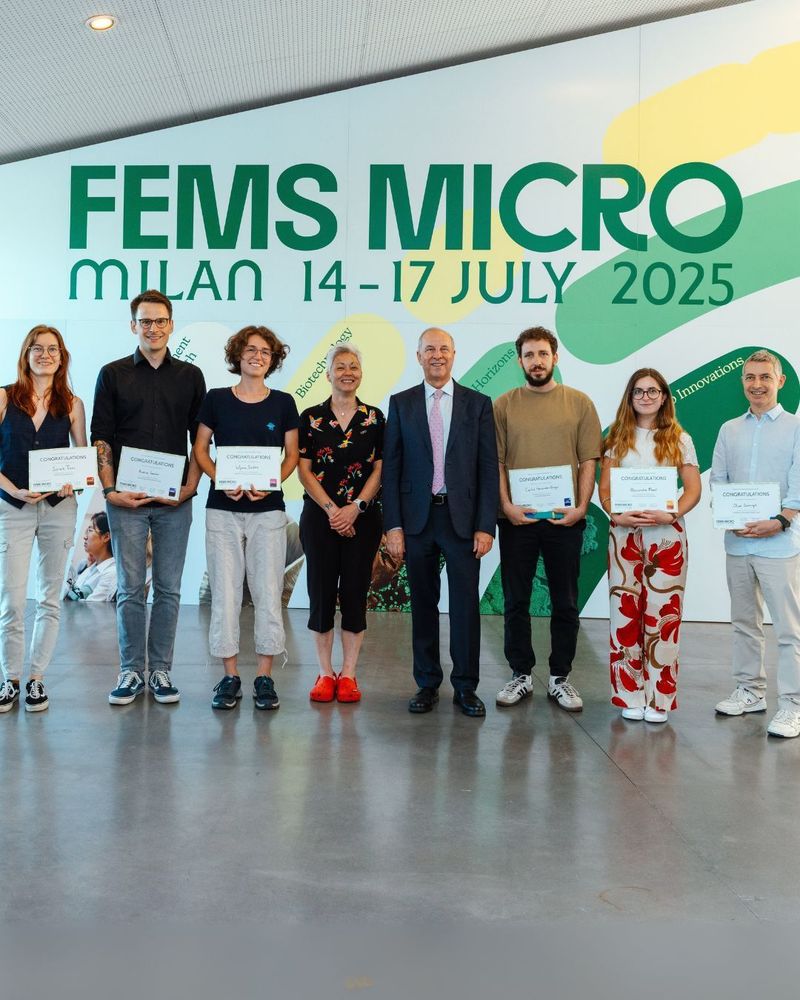
August 13, 2025 at 1:06 PM
I was very honored to receive on of the Poster prizes at FEMS MICRO 2025 in Milan a few weeks back. It was such a great conference, heard so many interesting and stimulating talks & poster discussions.
Reposted by Carmen Buchrieser
Avirulent Pseudomonas aeruginosa T3SS-negative strains belonging to Clade 5 produce variable quantities of secondary metabolites
@femsjournals.bsky.social #microLife from @inaattree.bsky.social
with @cbuch.bsky.social
academic.oup.com/microlife/ad...
@femsjournals.bsky.social #microLife from @inaattree.bsky.social
with @cbuch.bsky.social
academic.oup.com/microlife/ad...
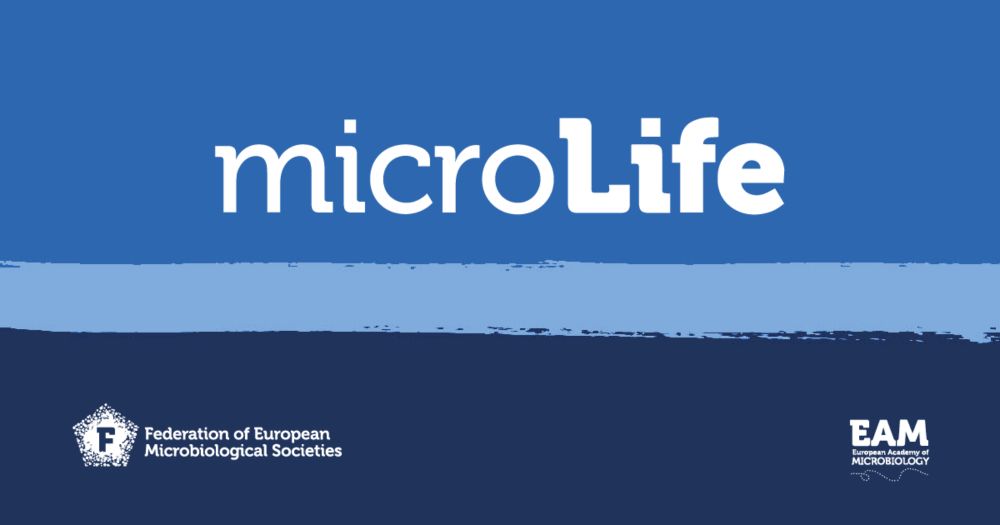
Avirulent Pseudomonas aeruginosa T3SS-negative strains belonging to Clade 5 produce variable quantities of secondary metabolites
Abstract. Pseudomonas species are ubiquitous in the environment and serve as valuable source of enzymes and secondary metabolites for industrial applicatio
academic.oup.com
August 22, 2025 at 11:34 AM
Avirulent Pseudomonas aeruginosa T3SS-negative strains belonging to Clade 5 produce variable quantities of secondary metabolites
@femsjournals.bsky.social #microLife from @inaattree.bsky.social
with @cbuch.bsky.social
academic.oup.com/microlife/ad...
@femsjournals.bsky.social #microLife from @inaattree.bsky.social
with @cbuch.bsky.social
academic.oup.com/microlife/ad...
Reposted by Carmen Buchrieser
This 👇
🚨🚨 New paper in @narjournal.bsky.social! 🍾
Excludons are pairs of overlapping genes that block each other’s expression (basically, reverse operons).
We built a tool to identify them in bacterial genomes using transcriptomic data, in an awesome collab led by Iñigo Lasa and Álvaro San Martín.
👇
Excludons are pairs of overlapping genes that block each other’s expression (basically, reverse operons).
We built a tool to identify them in bacterial genomes using transcriptomic data, in an awesome collab led by Iñigo Lasa and Álvaro San Martín.
👇
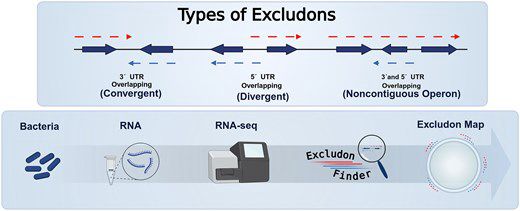
ExcludonFinder: mapping transcriptional overlaps between neighboring genes
Abstract. Bacteria regulate neighboring genes via overlapping transcription in untranslated regions (UTRs), forming excludons. This overlap leads to transc
academic.oup.com
July 27, 2025 at 9:09 AM
This 👇
Reposted by Carmen Buchrieser
Congratulations to 2025 GRC Microbial Adhesion and Signal Transduction Poster Award Winners!! 🎆🥂🙌 Thank you @cp-cell.bsky.social and @femsmicro.org for sponsoring!
From,
Your secret judges 🤫
From,
Your secret judges 🤫
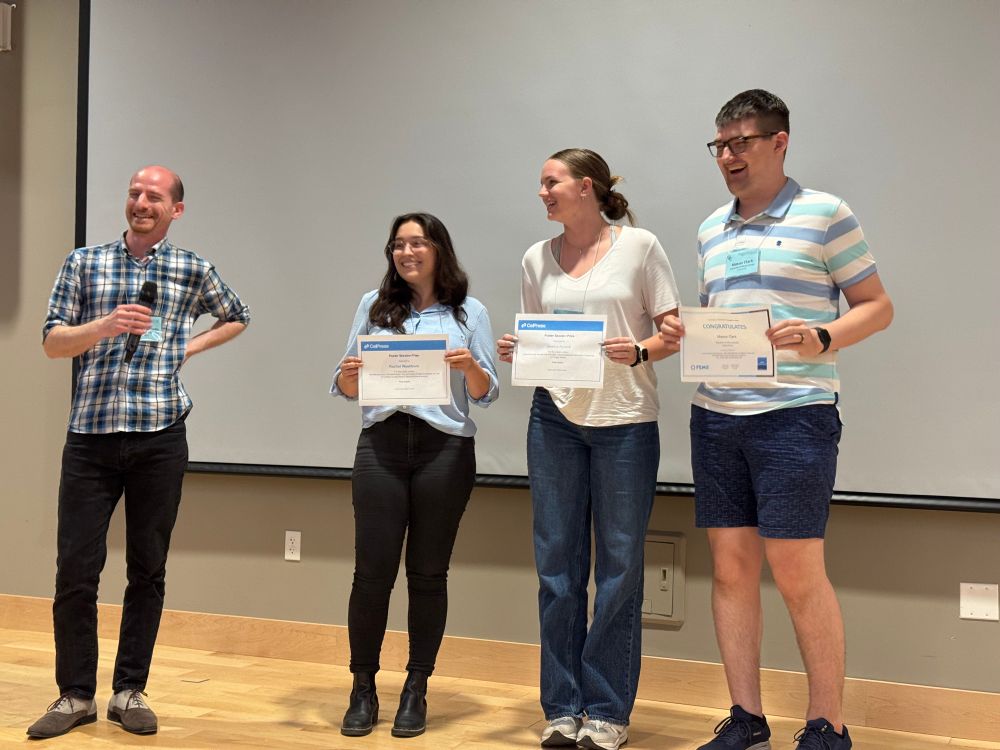
July 25, 2025 at 4:21 AM
Congratulations to 2025 GRC Microbial Adhesion and Signal Transduction Poster Award Winners!! 🎆🥂🙌 Thank you @cp-cell.bsky.social and @femsmicro.org for sponsoring!
From,
Your secret judges 🤫
From,
Your secret judges 🤫
Reposted by Carmen Buchrieser
Congratulations @cbuch.bsky.social ! 👏
FEMS MICRO Milan 2025 is off to a great start with Prof. Carmen Buchrieser presenting her keynote on Legionella pneumophila and the fascinating ways this pathogen mimics eukaryotic cells.
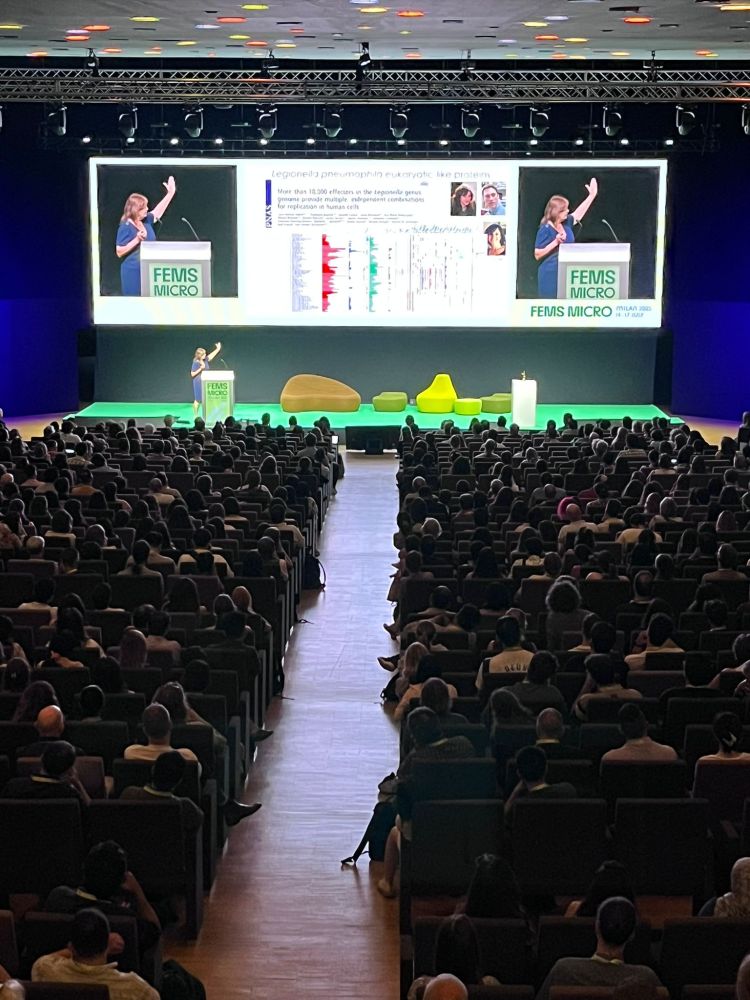
July 16, 2025 at 2:08 PM
Congratulations @cbuch.bsky.social ! 👏

